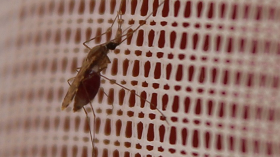
The Centre for Research in Infectious Diseases (CRID) in Cameroon has been awarded a $3.7 million grant by the Bill and Melinda Gates Foundation for the detection of molecular markers of insecticide resistance in malaria vectors in collaboration with researchers at LSTM and with other partners in Ghana, Cameroon and Uganda.
The grant, led by Wellcome Trust Senior Fellow Professor Charles Wondji, from the Department of Vector biology at LSTM, will develop fast and accurate tools for detecting resistance mechanisms in field-caught mosquitoes. The current method for detecting insecticide resistance in populations of mosquitoes uses labour-intensive bioassays, requiring the collection of hundreds of mosquitoes, rearing in insectaries and testing on several replicates of adult mosquitoes. Consequently, faster and less labour-intensive tools are vital to fully understand the levels of insecticide resistance in mosquito populations and develop ways to help detect and track the spread of resistance.
Professor Wondji said: “Efforts to reduce Malaria burden rely extensively on the control of mosquitoes using insecticides. However, insecticide resistance observed in mosquito species that transmit this disease, is currently threatening our ability to control malaria in Africa. To prolong the continued effectiveness of control methods, it is necessary to better understand how these mosquitoes acquire resistance to insecticides including novel ones that are gradually been approved by the World Health Organisation (WHO)” The funding will contribute towards identifying molecular markers which drives resistance to the main insecticide classes used to target malaria vectors and will inform the design of field applicable diagnostic tools.
The work of CRID is focused on fighting infectious diseases in Africa by providing an excellent environment to perform high quality and internationally recognised research in Cameroon and the Central African region, and this award will support in its fight against insecticide resistance in mosquitoes with significant support from LSTM.